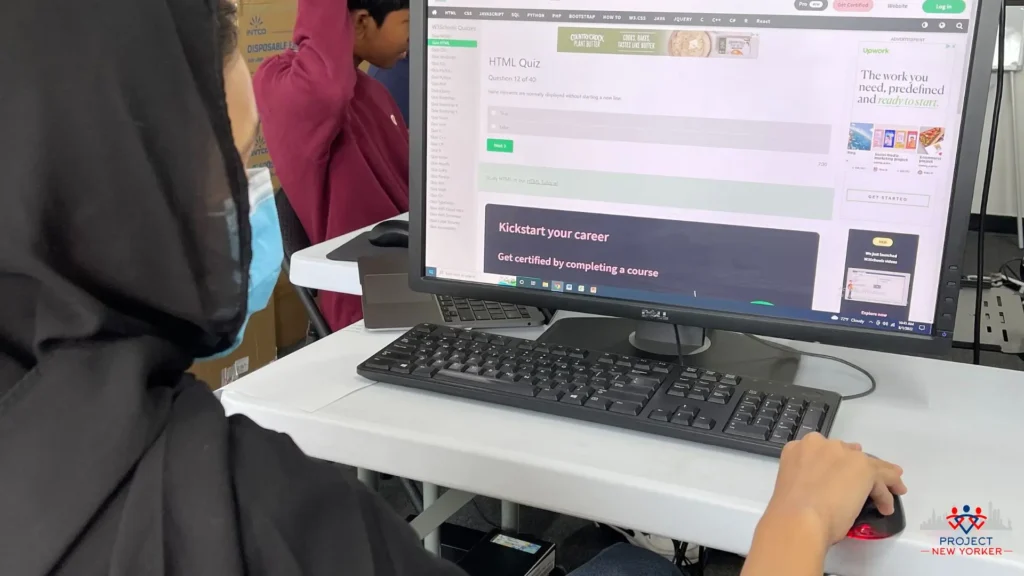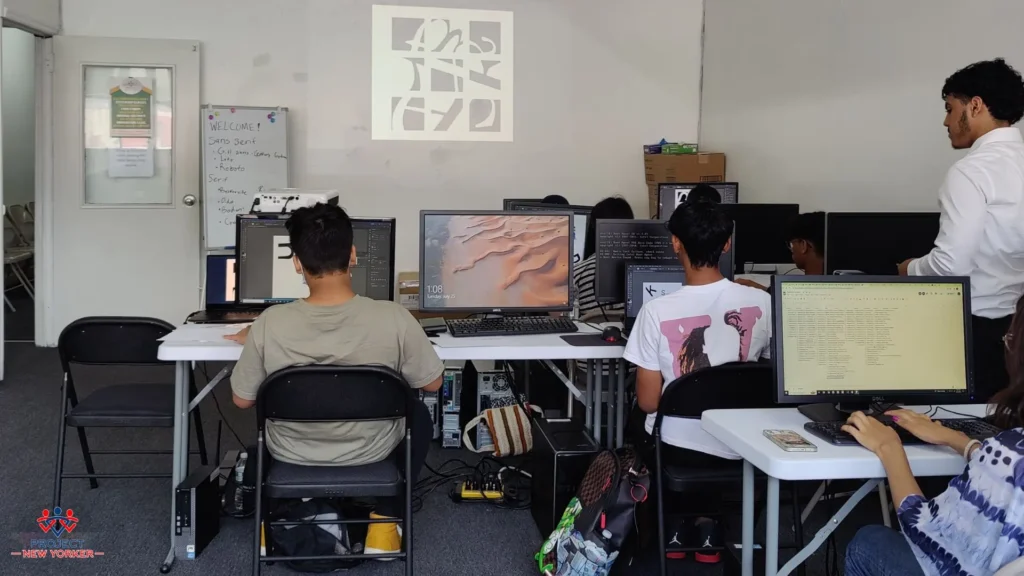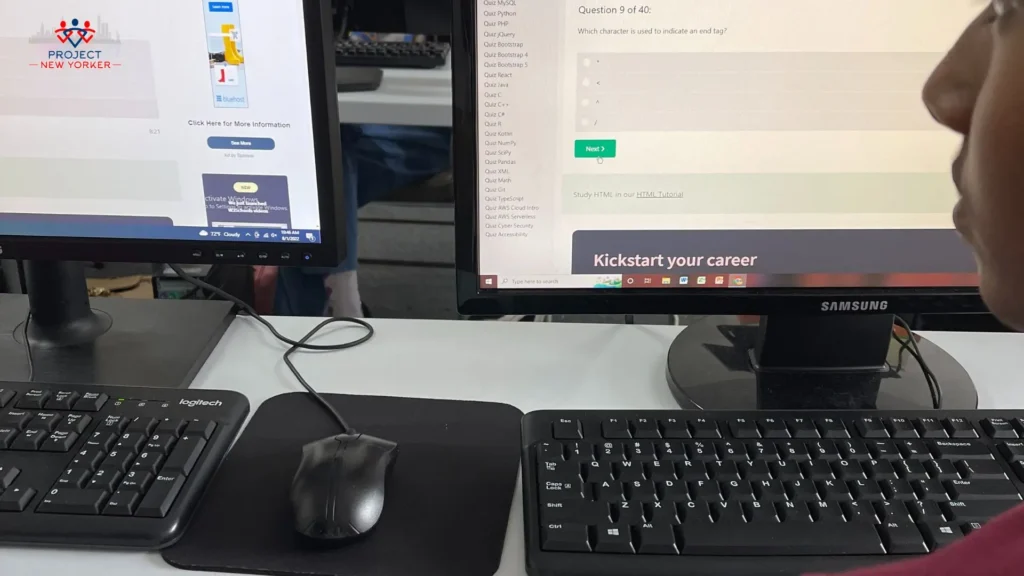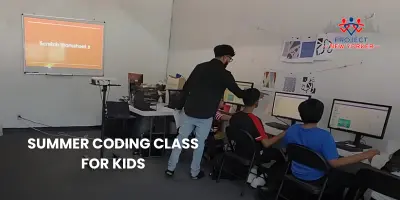What Is Digital Literacy and Why Is It Important?
Digital literacy confines our skills required to understand and use digital technologies. It involves peoples critical thinking and ability to navigate online environments.
In this modern world digital age means more than just using technology. It’s about competence to access, analyze, create, and communicate in an increasingly digital world.
Digital literacy is not only based on a single aspect, it also spans various dimensions including knowledge of basic hardware and software, understanding of internet navigation, and the ethical use of online platforms.
From students to professionals must cultivate these competencies to thrive in modern society. As the digital landscape evolves, staying digitally literate is a continuous journey, essential for participation in the global economy and for engaging with a broader community in an effective, safe, and secure manner.

What Is Digital Literacy and Why Is It Important?
Digital literacy has become a fundamental skill in the 21st century, related to reading and writing in previous centuries. It bounds a range of abilities that are essential for navigating the technology-saturated world we live in today. Digital Literacy is not merely about knowing how to use a computer; it involves critical thinking and digital problem-solving skills that enable individuals to engage, express, collaborate, and communicate in all aspects of life.
According to the American Library Association (ALA), Digital literacy is the ability to search, evaluate, and communicate information through technology. Beside usage of digital tools it is also a matter of understanding how to use them effectively and responsibly.
This type of literacy helps you in equipping yourself with the skills to navigate the digital realm safely and confidently.
Importance Of Digital Literacy
Relevance of digital literacy cannot be overstated. In this time of digital age, the ability to understand and utilize technology influences every aspect of life—from personal growth to global participation in the digital economy. Some main key points for highlight its significance are:
- Employment Opportunities: Proficiency in digital tools is often a prerequisite for job candidates.
- Educational Resources: Digital skills open up a wealth of learning materials online.
- Global Communication: Internet breaks down geographical barriers, allowing instant interaction with diverse cultures.
- Information Literacy: Being digitally literate aids in discerning the credibility of online content.

Evolution Of Digital Literacy
Concept of digital literacy has changed as technology has advanced. It began with basic ability to operate a computer and now includes a wide range of competencies:
| Year | Skills |
| 1990s | Typing, Basic Computing |
| 2000s | Email, Internet Browsing |
| 2010s | Social Media, Cloud Services |
| 2020s | AI Interaction, Data Analytics |
Progression of digital literacy highlights an ongoing shift toward more complex and integrated uses of technology. To stay current, individuals and organizations must adapt and continuously refine their digital skill sets.
Digital Literacy Skills
Understanding digital literacy skills is essential in our technology-driven age. To thrive in the digital realm, mastering these competencies is crucial as learning to read and write. In essence, digital literacy encompasses a wide array of skills ranging from information evaluation to the responsible use of online platforms. Here, we delve into the core abilities that define a digitally literate individual.
Critical Thinking And Evaluation
In this time of globalization, critical thinking and evaluation are paramount. Digital users must discern credible information from misleading content. This necessitates:
- Analysis of digital resources for accuracy and bias
- Assessment of the relevancy and currency of online data
- Understanding the nuances between opinion and fact
Users who are Equipped with these skills, can navigate the vast digital landscape with a discerning eye by ensuring the veracity and usefulness of consumed information.
Communication And Collaboration
Digital environment extends beyond individual use. Now it’s become a social platform where communication and collaboration reign supreme. Core skills include:
- Effective digital communication using various platforms like email, forums, and social media
- Collaboration using online tools such as shared documents, project management software, and virtual meeting spaces
- Understanding digital etiquette, including tone, privacy, and respect for intellectual property
With these capabilities, one can participate in global conversations, contribute to group projects, and foster community regardless of physical boundaries.
Privacy And Security Awareness
Digital users must be vigilant about privacy and security. Key elements of this critical skill set include:
| Privacy Skill | Description |
| Personal Information Management | Controlling what personal data is shared and understanding how it can be used against you |
| Use of Privacy Settings | Adjusting configurations on social media and other online platforms to protect your identity |
| Security Practices | Implementing strong passwords, using reliable antivirus software, and recognizing phishing attempts |
A solid grounding in these areas is indispensable for ensuring personal and professional data remains secure from various threats.
Principles of Digital Literacy

Digital literacy is grounded in four fundamental principles. Each of the principles forming the core of developing digital literacy skills. Principles of Digital Literacy are as follows:
Understand What You See Online: Digital literacy means knowing how to really get what you’re looking at on the internet. It’s not just about the surface stuff, but digging deeper to grasp the details on digital platforms.
Realize Everything Is Connected: Digital stuff on the web is like a big web of connections. When you know how things link up, you can use digital content better.
Know People Are Different: Remember, online, people come from all walks of life, like different ages, have various educations, jobs, and families. All of these things impact how stuff is made, shared, and stored online.
Learn to Organize What You Find: Think of digital curation as creating your own online library. You can pick and choose what you want to keep, so you can easily find it later.
Above 4 principles are like a map to help you navigate in the digital world. It can help you to understand, connect dots, respect diversity, and stay organized in the vast world of the internet.
Digital Literacy For Lifelong Learning
Embracing the concept of digital literacy is critical in a evolved digital world, especially with its profound impact on lifelong learning. This type of learning is not just confined to the classroom; it extends into every facet of our lives.
Digital literacy enhances the ability to learn new skills, adapt to changing environments, and access vast resources available through technology. Let’s delve into the various ways digital literacy propels learners of all ages towards ongoing personal and professional development.
Professional Development
In today’s fast-paced world, staying competitive means never standing still. Professional development is a perpetual journey, and digital literacy offers the tools necessary for this quest. With digital competencies, individuals can:
- Enhance job performance by keeping up with industry trends and software updates.
- Participate in online workshops, webinars, and courses that fit within busy schedules.
- Collaborate with global experts, gaining insights and exchanging ideas.
Access To Online Resources
Internet is a treasure trove of information and learning materials— from scholarly articles to instructional videos, educational games to digital libraries. Those who are digitally literate unlock the potential to:
- Discover a wide range of resources tailored to specific learning needs and interests.
- Drive self-paced learning by accessing online tutorials, courses, and certification programs.
- Engage with interactive and multimedia content for a more enriching learning experience.
Navigating The Digital Landscape
Digital landscape is vast and navigating it can be daunting without the necessary skills. Digital literacy empowers individuals to navigate the digital world with confidence and ease. By being digitally literate, users can:
- Identify credible information and avoid the pitfalls of misinformation.
- Use various tools and platforms effectively, from social media to cloud storage.
- Protect personal information and privacy through understanding cybersecurity basics.
Digital Literacy Skills and Their Everyday Use
Digital literacy skills necessary for people to navigate in this digital world effectively. These skills can be applied in the following ways:
- Digital media: Skills in digital literacy allows ease and comfort of navigating digital media in everyday life.
- Researching: Individuals will gain the ability to find information and identify reliable sources within different digital platforms.
- Social Inclusivity: Digital literacy skills removes barriers of location, allowing for an increase in social opportunities and connection with those online.
- Understanding Digital Media: With these skills people will be more familiar with common digital media terms and will be able to navigate digital features in their totality.
How to Develop Digital Literacy Skills
Here are some tips from experts to develop and strengthen digital literacy skills.
- Explore with digital tools to understand how they work.
- Stay updated about the latest technologies to remain relevant.
- Focus on technology devices and digital platforms that align with your needs and preferences.
- Be open to learning new things as the digital landscape is always evolving.
- Enroll in online courses to gain insight into different digital technologies and their uses.
- Seek help when encountering new technology devices or platforms.
Frequently Asked Questions On What Is Digital Literacy
What Is Meant By Digital Literacy?
Digital literacy refers to an individual’s ability to find, evaluate, and compose clear information through writing and other mediums on various digital platforms. It is crucial for effective communication and problem-solving in the digital age.
Why Is Digital Literacy Important?
Digital literacy is important as it empowers people to navigate technology confidently. This includes safely managing personal data, understanding online resources, and being proficient in digital tools, which are vital skills in today’s tech-driven world.
How Can You Improve Your Digital Literacy?
Improving digital literacy involves regular use of technology, seeking education through online courses or workshops, and practicing critical evaluation of digital content. Staying updated with technological advancements also greatly enhances digital literacy skills.
What Are The Key Components Of Digital Literacy?
Key components of digital literacy include technical skills to use devices, cognitive skills for critical thinking, and ethical understanding for responsible use of technology.
Bottom Line
Nowadays digital literacy is becoming one of the essential parts for individuals navigating this digital world. Development of these skills ensures that individuals can explore digital platforms safely and responsibly.



